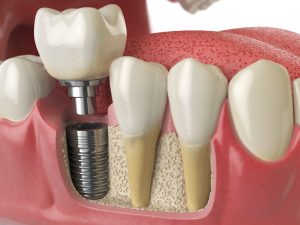
Dental implants are considered one of the most effective methods for replacing missing teeth. They act and function like a natural tooth and can last a lifetime if cared for properly! That said, dental implants are not completely infallible. Although they are incredibly durable, it is possible for them to loosen or potentially even fail. Keep reading to learn what to do if you’re worried about your dental implant isn’t feeling as secure as it should!
What Should I Do If My Dental Implant Feels Loose?
As with most oral issues, if you’ve noticed anything unusual about your dental implants then your first step is to call your dentist. A wobbly restoration isn’t always considered an emergency, but they’ll want to ensure they’re taking proper precautions. Your dentist’s office might ask questions to identify what’s happening, like:
- How loose is it?
- Is it still in place or has it fallen out entirely?
- Is it loose under your gums or just the crown portion?
- Are you in pain or discomfort?
This helps inform them about your condition and determine how soon they need to see you.
Why Did My Dental Implant Loosen?
Although it’s not entirely uncommon for dental implants to gain some wiggle room, it’s still problematic. There are two issues that typically cause this.
- The crown. This is the most likely culprit. If the cement attaching the crown (the tooth-shaped portion) to the abutment (the support rod) deteriorates, then the two can start to separate. Also, if the crown itself cracks or chips, it can detach. Biting or chewing hard foods and objects can result in this kind of damage. Your dentist will need to reattach it or provide a new one if it’s too far gone.
- The root. Dental implants are stable because your jawbone fuses with the abutment to act like the root of a natural tooth. If the rod isn’t bonded with your bone, then you might be experiencing dental implant failure. This is less convenient, but still can be fixed. It sometimes happens if you don’t have sufficient bone density necessary to support the replacement tooth. If that’s the case, your dentist might need to perform a bone graft to bulk it up before a new implant can be placed.
Of course, you won’t fully know the extent of the damage or how to fix it until you can get in to see your dentist. Once they’ve identified the issue, they’ll provide treatment options so that soon you’ll have a secure, confident smile once again!
About the Author
Dr. Barry R. Franzen earned his DDS from the Marquette University School of Dentistry in 1985 which he followed with prosthodontic training at the University of Missouri and Truman Medical Center. He’s focused specifically on esthetic replacement teeth and implant dentistry. That makes him an expert at replacing teeth! If you’re worried about the state of your dental implant, you’re welcome to request a consultation on the website or by calling (414) 543-5432.
